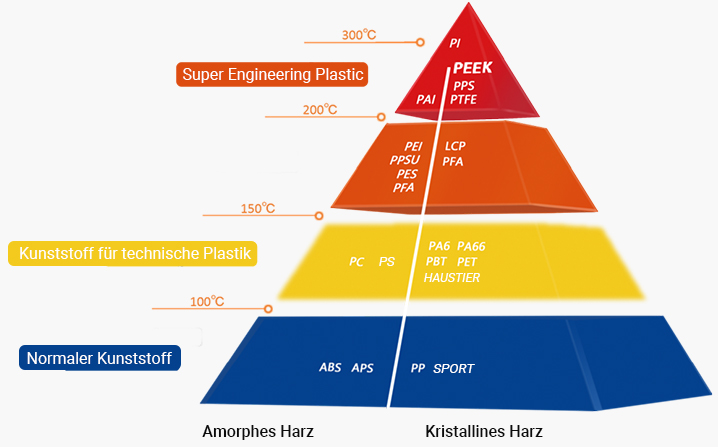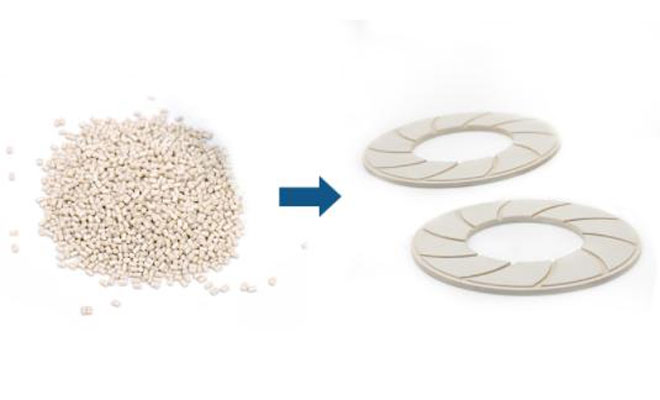Poly (ether ether ketone)(PEEK) is a linear polymer whose main chain is composed of Aryl, ketone and ether bonds. PEEK has a large number of benzene rings in its molecular chain, so its heat resistance can match that of polyimide, while two ether chains and a renegade group provide the material with flexibility and excellent workmanship.The structure is as follows:


 High Temperature Performance
High Temperature Performance High Wear Resistance
High Wear Resistance Mechanical Strength and Dimensional Stability
Mechanical Strength and Dimensional Stability Resistance to Harsh Chemicals
Resistance to Harsh Chemicals High Electrical Integrity
High Electrical Integrity High Purity & Bio Inert
High Purity & Bio Inert![]()
Aerospace
![]()
Food
![]()
Mechanics
![]()
Medicine
![]()
Oil and gas
![]()
Semiconductors
We started the PEEK polymerization project in 2014 and completed the pilot test in 2016. In 2018, Shandong Junhao HPP Co., Ltd. was officially established in Jining, Shandong Province, China, to carry out industrial production of PEEK polymerization, and finally in 2019, we complete the production of PEEK industrial chain.

lending modification is usually the most commonly used modification method for PEEK materials. Generally, fibers, metal oxides, inorganic fillers and other high molecular polymers such as PTFE can be added to the raw materials. The PEEK composite material prepared by this method can improve the defects of PEEK by using the composite effect, and improve the comprehensive properties of the material to a great extent.
The glass fibres play a reinforcing role in the components, while their inherent non-conductivity is suitable for use in materials with high insulation requirements and high rigidity.
According to the liquidity, it can be subdivided into: PEEK3600GF30; PEEK5600GF30; PEEK7600GF30.
PEEK3600GF30 is a high mobility pure PEEK particle, and PEEK7600GF30 is a low mobility PEEK particle.
| Item | Test Standard or Instrument | Unit | (PEEK+30%Glass fuber) PEEK3600GF30 | (PEEK+30%Glass fuber) PEEK5600GF30 | (PEEK+30%Glass fuber) PEEK7600GF30 |
|---|---|---|---|---|---|
| Tensile strength (23 ℃) | ISO-527 | MPa | 163 | 162 | 163 |
| Tensile modulus (23 ℃) | ISO-527 | GPA | 11 | 11 | 11 |
| Tensile elongation (23 ℃) | ISO-527 | % | 3.4 | 3.3 | 3.3 |
| Bending strength (23 ℃) | ISO 178 | MPA | 248 | 247 | 247 |
| Bending modulus (23 ℃) | ISO 178 | GPA | 9.5 | 8.9 | 8.9 |
| Compressive strength (23 ℃) | ISO 604 | MPA | 248 | 248 | 248 |
| LZOD notched impact strength | ISO 180/A | KJ/㎡ | 55 | 57 | 57 |
Most standard reciprocating screw injection moulding machines are capable of moulding unfilled and filled PEEK grades. Complex and intricate high performance components can be mass-produced without annealing or conventional machining. technical experts can assist with design and process variables such as machine design, barrel capacity, screw and mold design and gating.
PEEK thermoplastics can be used in extrusion processes and equipment including wire coating, profile extrusion, film, pipe, sheet and monofilament production. Unfilled and filled grades are readily extruded using conventional melt processing technology. Our highly experienced technical team can help define the machine design and address any processing challenges.
Compression moulded parts are generally more crystalline, have a higher modulus and tensile strength and are harder with a lower ductility. Glass and carbon fibres may be combined with PEEK for compression moulding. Our technical team recommends that our customers anneal parts with very thick sections to relieve stresses.